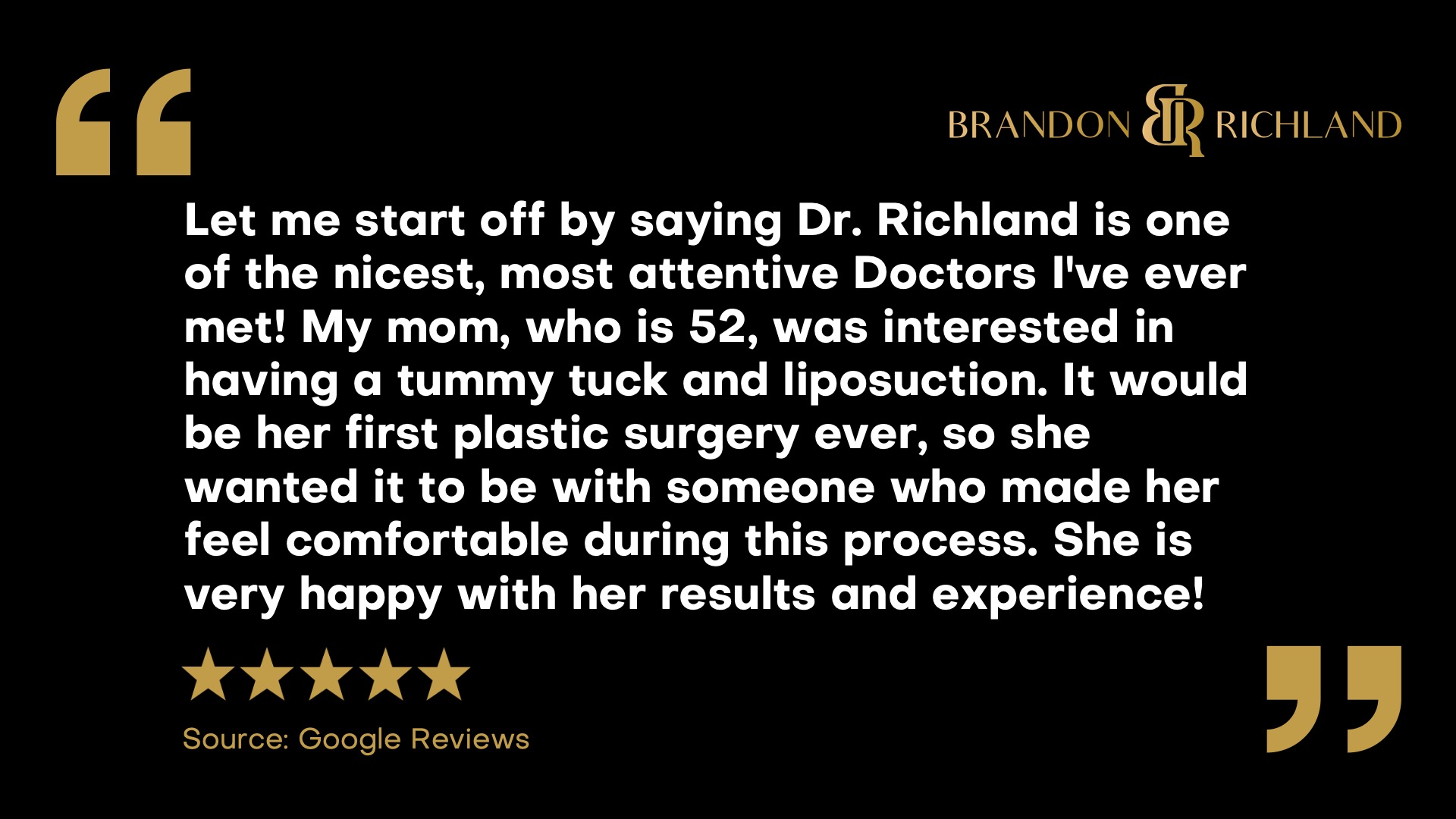Published by Dr. Brandon Richland, MD

“Let me start off by saying Dr. Richland is one of the nicest, most attentive Doctors I’ve ever met! My mom, who is 52, was interested in having a tummy tuck and liposuction. It would be her first plastic surgery ever, so she wanted it to be with someone who made her feel comfortable during this process. She is very happy with her results and experience!
Read the full Google Review here.
Understanding Plastic Surgery
Plastic surgery encompasses a range of procedures aimed at enhancing or restoring the appearance and function of the body. This section will explore the different types of procedures available, guide you in selecting a qualified plastic surgeon, and discuss how to ensure safety and quality in cosmetic procedures.
Types of Procedures
Plastic surgery can be broadly categorized into two main types: cosmetic and reconstructive. Cosmetic procedures are elective and focus on improving aesthetic appeal, symmetry, and proportion. Common cosmetic surgeries include:
- Rhinoplasty: reshaping the nose.
- Liposuction: removing fat deposits.
- Breast augmentation or reduction: adjusting breast size.
- Facelift: reducing facial wrinkles.
Reconstructive procedures aim to correct defects on the face or body, including those caused by trauma, birth disorders, or medical conditions. These surgeries are typically more complex and might involve:
- Cleft lip and palate repair.
- Reconstruction post-mastectomy.
- Scar revision surgery.
Choosing a Qualified Plastic Surgeon
When considering plastic surgery, selecting a board-certified plastic surgeon is imperative. Board certification indicates that a surgeon has undergone rigorous training and assessment, ensuring a high standard of care. Patients should look for certification from reputable organizations such as the American Board of Plastic Surgery (ABPS) and membership with the American Society of Plastic Surgeons (ASPS). Verifying a surgeon’s credentials involves:
- Confirming their certification with the ABPS.
- Reviewing their membership status with the ASPS.
- Assessing their experience with the desired procedure.
Preparing for Surgery
Patients need to approach plastic surgery with a well-informed mindset and clear objectives. Careful planning and consideration are crucial for a successful outcome.
Setting Realistic Expectations
It is essential for individuals to have realistic expectations regarding the outcomes of plastic surgery. Communicating openly with the surgeon about the desired results can lead to a more satisfactory experience. A patient should understand the limitations and potential of the procedures.
The Planning Phase
During the planning phase, a detailed roadmap is constructed, which includes choosing the correct procedure and scheduling the surgery date. Patients participate in decision-making, evaluating their options, and creating a plan with their surgeon. Diagnostic images and pre-surgical tests may be part of the preparation.
- Procedure Selection: Select based on goals and surgeon’s advice.
- Scheduling: Consider recovery time and personal commitments.
Understanding the Risks
Plastic surgery, like any operation, carries certain risks. Surgeons must inform patients about possible complications such as infection, scarring, and anesthesia reactions. Knowledge of these risks helps in both mentally preparing for surgery and in making an informed decision.
Risks
Infection
Description: Possible post-operative complication; requires care.
Scarring
Description: Natural healing process that can be minimized with proper treatment.
Anesthesia Reactions
Description: Varies from mild discomfort to more serious implications.
Lifestyle Considerations Prior to Surgery
Adopting a healthy lifestyle is critical before undergoing plastic surgery. Patients should:
- Avoid smoking: Smoking can impede healing.
- Maintain a healthy diet: Nutrition aids in recovery.
- Limit alcohol: Alcohol can affect surgical outcomes.
These lifestyle adjustments can significantly impact the recovery process and overall experience.
Post-Surgery Experience
The journey after plastic surgery is critical, as it involves attentive care and adherence to medical guidance to ensure proper recovery and the desired outcomes.
Recovery and Healing
After plastic surgery, patients enter the recovery phase, where the body’s natural healing processes take over. Rest is paramount, with most surgeons advising patients to limit physical activity. Healing times vary depending on the procedure:
- Minor surgeries: typically a few days to a week.
- Major surgeries: several weeks to months.
Patients must follow their surgeon’s instructions on wound care to minimize scarring. This includes regular cleaning and application of any prescribed ointments.
Managing Complications
Complications, although rare, can occur. Patients should be vigilant for signs of infection, such as unusual redness, swelling, or discharge, and seek medical attention immediately. Other potential complications include:
- Bleeding: noticeable bleeding beyond the typical seepage.
- Smoking: impedes the healing process and increases complication risks.
- Measures like wearing compression garments might be recommended to manage swelling.
Long-Term Care and Maintenance
Long-term care is essential for maintaining results. This includes:
- Weight maintenance: Significant fluctuations can affect the surgical outcome.
- Healthy lifestyle choices: consistent skincare routine and sun protection to preserve skin quality.
Good follow-up care with the plastic surgeon ensures any issues are caught early and managed appropriately.
Schedule Your First-Class Cosmetic Consultation with Dr. Brandon Richland, MD
Contact Dr. Richland today by visiting RichlandMD.com, scheduling a cosmetic consultation, or by calling 714-844-0398 or 949-997-2958 directly.











